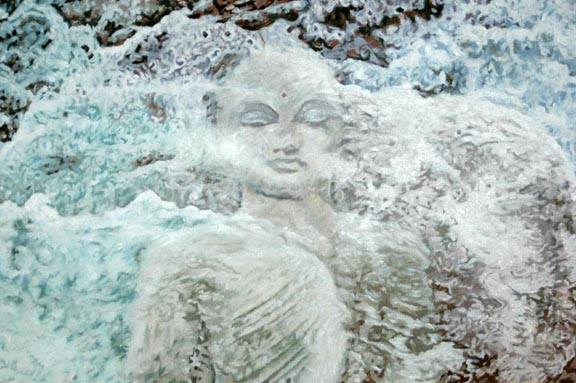 In the language of India, Pratimoksha Sutra.
In the language of India, Pratimoksha Sutra.
In English, The Sutra of Individual Liberation.
[Prefatory and Introductory Verses]
Homage to the Omniscient One.
(1) Your banner of glory is renowned in the triple world,
Your lion’s voice proclaims words of true Dharma;Omniscient One who has found the store of jewels,
Brahma’s and Indra’s crown-jewels touch your feet.
(2) You have crossed the bottomless, endless ocean of suffering,
Chief of migrators – with my crown I salute you.
The vessel of jewels of the All-Knowing’s moral precepts
I shall unfold amidst the assembly of aryas.
(3) Of the entire, bottomless
And limitless ocean of the Buddha’s
Vinaya, the abiding heart
And essence is this pratimoksha.
(4) It is the supreme guide of all
Dharmas of the king of true Dharma.
It is the great shop selling trainings
Of the bhikshus’merchants’ guild.
(5) It is a poison-clearing drug
For those immorality has seduced.
It is a goad for young bipeds
Blundering through youthfulness.
(6) It is a boat that rescues from
Samsara, deeper than the sea.
It is a certain dyke or bridge
For going to good destinies.
(7) It is the best royal counsellor
On the path that conquers klesa;
It is like the base of a staircase
For entering the city of liberation.
(8) “When I have entered into nirvana
It will be your teacher” – so
With devotion the Self-Arisen earnestly
Praised it before the assembly of monks.
(9) Even the word expressing “buddha”
Is exceedingly rare in the worlds.
Gaining humanity is very hard.
Going forth also is very rare.
(10) Likewise, perfect morality of
Those gone forth is very rare.
Even with perfectly pure morality,
Good companions are hard to find.
(11) A buddha’s arising in the world,
Being human, going forth,
Perfect morality and good friends –
When they have found these rarities,
(12) The wise who want what’s good for them
Will desire to make them fruitful;
Such ascetics will endeavour
To listen to the pratimoksha.
(13) Monks with all faculties, senses tamed,
Changelessly gone-forth for buddhahood,
Desiring definite liberation,
Always keep the pratimoksha.
(14) Even in tens of millions of eons
It is rare to hear, retain
And comprehend the pratimoksha;
To practise it is also very rare.
(15) Happy is the arising of buddhas,
Happy their teaching of the Dharma,
Happy the concord of the Sangha,
Happy austerities of the concordant.
(16) Happy it is to see arya beings,
Happy the company of the holy,
And to see no childish beings
Is perpetual happiness.
(17) Happy it is to see moral people,
Happy it is to see the learned;
Seeing arhats, who are free
From rebirth, is happiness.
(18) Happy the river with easy banks,
Happy the person familiar with Dharma.
Happy is the attainment of wisdom,
Happy the ending of pride of ‘I am’.
(19) Happy is the situation of
The resolute, who tame their senses and,
Learned, grow old in peaceful wilderness,
Letting their youthfulness pass by in forests.
(20) Joining my palms, with my ten fingers,
To that lion of the Shakyas,
I shall recite the pratimoksha.
Hear from me the vinaya’s meaning.
(21) Having heard, then practise just
As the Great Ascetic taught.
On the slightest non-virtues
Practise it with diligence.
(22) The pratimoksha is a bridle
With hundreds of sharp spikes, suited to
The horse of the mind, so hard to steer
And always driven with effort.
(23) Great ones who are stopped by just
A word, not going past the bounds,
Are the finest human horses,
Sure to overcome defilements.
(24) Those who do not have this bridle
Nor desire to ever, either,
Will roam about without settling down,
Confused by the army of defilements.
© Nalanda Monastery (France) http://www.sangha.it/en/content/pratimoksha-sutra/index.html